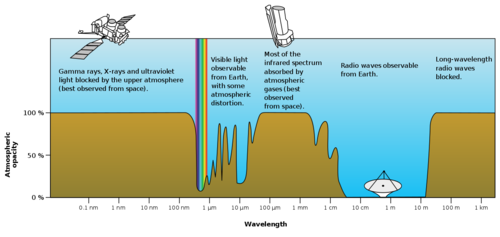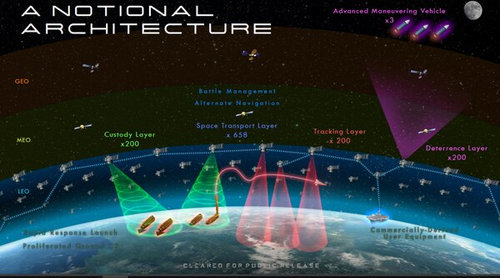4.2 Impacts on ground based radio-astronomy
Even with best coating and mitigation procedures to decrease the impacto on visual astronomical observations, what it is often omitted or forgotten is that telecommunication constellations will shine in the radio wave lengths bands, observable from the ground.The scientific needs of radio astronomers and other users of the passive services for the allocation of frequencies were first stated at the World Administrative Radio Conference held in 1959 (WARC-59). At that time, the general pattern of a frequency-allocation scheme was:
1. that the science of radio astronomy shouldbe recognized as a service in the Radio Regulations of the International Telecommunication Union (ITU);
2. that a series of bands of frequencies should be set aside internationally for radio astronomy
3. that special international protection should be afforded to thehydrogenline(1400-1427 MHz), the hydroxyl(OH) lines(1645-1675 MHz), and to the predicted deuterium line(322-329MHz)...
Since 1959 a large number of spectral lines from a wide variety of atoms and molecules in space have been discovered, then the frequency range of radio astronomy now extends to at least 500 GHz. In particular frequencies of the CO molecule (at 115, 230, and 345 GHz), isotopes (at 110, 220, and 330 GHz) and the maser of H2O at 22,235GHz [29], are critical to many aspects of astronomy, see also [21]. Radio astronomers have been engaged for decades in the work of the United Nations Agency ITU to regulate the international use ofthe radio frequency spectrum. Their efforts ensured a limited number of narrow bands of the spectrum received protection to allow radio astronomy to develop and conduct essential and unique research. Despite the special international protection for Radio-astronomy, some sources of radiofrequency interference (RFI) are inescapable. While radio astronomers can minimize the effects of many terrestrial sources by placing their telescopes at remote sites, none can escape from RFI generated by satellite transmitters, such as those of the Iridium System, SpaceX, and others. Whilst there is legislation in place where radio observatories are placed (e.g. at the two SKAsites in Australia and South Africa) to protect the telescopes from ground-based radio interference at those frequencies, the use of air and space-borne radio communications is regulated on a collaborative international basis. What is not widely acknowledged is that the development of the latest generation telecommunication networks (both from space and from Earth) already has a profound impact on radio-astronomical observations (at all sub-bands): with LEO satellite fleets it is quite sure that the situation could become unbearable. In particular, low Earth orbit satellite’s spectral windows identified to communicate with earth stations in the Ku (12-18GHz), Ka (27-40GHz) and V (40-75GHz) bands will over-lap with the nominal radio-astronomy bandsand so will interfere with ground radio tele-scopes and radio interferometers, making the radio detectors enter in a non-linear regime in the K band (18-26.5GHz) and in Q band (33-50GHz). This fact will irreparably compromise the whole chain of analysis in those bands with repercussions on our understanding of the Universe, or even, making the astrophysics community blind to these spectral windows from the ground, see Fig 6. There are different projects in development for ground based radio-astronomy that will significantly overlap with telecommunication signals coming from the satellites’ constellations in orbit:
•TheNext Generation Very Large Ar-ray, ngVLAandngVLA Long Base-line Array, LBA[18]: located in NewMexico, west Texas, Arizona, and north-ern Mexico. The VLA will use 6 radio-bands: 2,4GHz, 8GHz, 16GHz, 27GHz,41GHz and 93GHz.
•TheSquare Kilometer Array, SKA[19], [23] will interfere with Ku satellitescommunication bands.
•TheAtacama Large Millimeter Ar-ray, ALMA[22], the world-leading mm and sub-mm observatory built in Atacama, Chile, with enormous expenses spent by a broad international community,facility that has brought us many significant discoveries and played a crucial role in the global system of EHT (first image of BH ever, published in April 2019), has its Bands 1, and 2+3 exactly in the potentially polluted part of the spectrum.
To aggravate the matter, with the current technological development, the planned density of radio frequency transmitters is impossible to envisage. In addition to millions of new commercial wireless hot spot base stations on Earth directly connected to the about 50,000 newsatellites in space, will produce at least 200 billion of new transmitting objects, according to estimates, as part of the Internet of Things(IoT) by 2020-2022, and one trillion of objects a few years later.Such a large number of radio-emitting objects could make radio astronomy from ground stations impossible without a real protection made by countries’ safe zones where radio astronomyfacilities are placed. We wish to avoid that technological development without serious control turns radio astronomy practice into an ancient extinct science.






